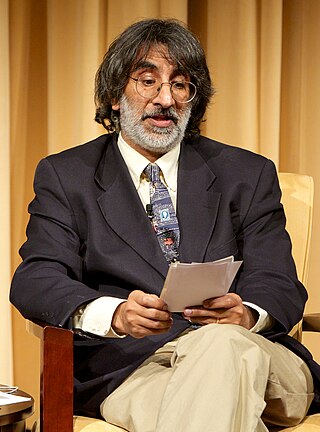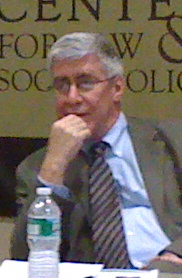Classical liberalism is a political tradition and a branch of liberalism that advocates free market and laissez-faire economics and civil liberties under the rule of law, with special emphasis on individual autonomy, limited government, economic freedom, political freedom and freedom of speech. Classical liberalism, contrary to liberal branches like social liberalism, looks more negatively on social policies, taxation and the state involvement in the lives of individuals, and it advocates deregulation.

Justice, in its broadest sense, is the concept that individuals are to be treated in a manner that is equitable and fair.
Secularism is the principle of seeking to conduct human affairs based on naturalistic considerations, uninvolved with religion.

In moral and political philosophy, the social contract is an idea, theory or model that usually, although not always, concerns the legitimacy of the authority of the state over the individual. Conceptualized in the Age of Enlightenment, it is a core concept of constitutionalism, while not necessarily convened and written down in a constituent assembly and constitution.
Communitarianism is a philosophy that emphasizes the connection between the individual and the community. Its overriding philosophy is based on the belief that a person's social identity and personality are largely molded by community relationships, with a smaller degree of development being placed on individualism. Although the community might be a family, communitarianism usually is understood, in the wider, philosophical sense, as a collection of interactions, among a community of people in a given place, or among a community who share an interest or who share a history. Communitarianism usually opposes extreme individualism and rejects extreme laissez-faire policies that deprioritize the stability of the overall community.

John Bordley Rawls was an American moral, legal and political philosopher in the modern liberal tradition. Rawls has been described as one of the most influential political philosophers of the 20th century.

A Theory of Justice is a 1971 work of political philosophy and ethics by the philosopher John Rawls (1921–2002) in which the author attempts to provide a moral theory alternative to utilitarianism and that addresses the problem of distributive justice . The theory uses an updated form of Kantian philosophy and a variant form of conventional social contract theory. Rawls's theory of justice is fully a political theory of justice as opposed to other forms of justice discussed in other disciplines and contexts.

Martha Craven Nussbaum is an American philosopher and the current Ernst Freund Distinguished Service Professor of Law and Ethics at the University of Chicago, where she is jointly appointed in the law school and the philosophy department. She has a particular interest in ancient Greek and Roman philosophy, political philosophy, existentialism, feminism, and ethics, including animal rights. She also holds associate appointments in classics, divinity, and political science, is a member of the Committee on Southern Asian Studies, and a board member of the Human Rights Program. She previously taught at Harvard and Brown.
Social liberalism is a political philosophy and variety of liberalism that endorses social justice, social services, a mixed economy, and the expansion of civil and political rights, as opposed to classical liberalism which supports unregulated laissez-faire capitalism with very few government services.
In political philosophy, limited government is the concept of a government limited in power. It is a key concept in the history of liberalism.

Akhil Reed Amar is an American legal scholar known for his expertise in constitutional law. He holds the position of Sterling Professor of Law and Political Science at Yale University, where he is a leading scholar of originalism, the U.S. Bill of Rights, and criminal procedure.

Jeremy Waldron is a New Zealander legal philosopher. He holds a University Professorship at the New York University School of Law, is affiliated with the New York University Department of Philosophy, and was formerly the Chichele Professor of Social and Political Theory at All Souls College, Oxford University. Waldron also holds an adjunct professorship at Victoria University of Wellington. Waldron is regarded as one of the world's leading legal and political philosophers.
Judith Nisse Shklar was a philosopher and political theorist who studied the history of political thought, notably that of the Enlightenment period. She was appointed the John Cowles Professor of Government at Harvard University in 1980.

Bruce Arnold Ackerman is an American legal scholar who serves as a Sterling Professor at Yale Law School. In 2010, he was named by Foreign Policy magazine to its list of top global thinkers. Ackerman was also among the unranked bottom 40 in the 2020 Prospect list of the top 50 thinkers for the COVID-19 era.
Liberalism is a political and moral philosophy based on the rights of the individual, liberty, consent of the governed, political equality, right to private property and equality before the law. Liberals espouse various and often mutually warring views depending on their understanding of these principles but generally support private property, market economies, individual rights, liberal democracy, secularism, rule of law, economic and political freedom, freedom of speech, freedom of the press, freedom of assembly, and freedom of religion, constitutional government and privacy rights. Liberalism is frequently cited as the dominant ideology of modern history.
Marriage privatization is the concept that the state should have no authority to define the terms of personal relationships such as marriage. Proponents of marriage privatization, including certain minarchists, anarchists, libertarians, and opponents of government interventionism, claim that such relationships are best defined by private individuals and not the state. Arguments for the privatization of marriage have been offered by a number of scholars and writers. Proponents of marriage privatization often argue that privatizing marriage is a solution to the social controversy over same-sex marriage. Arguments for and against the privatization of marriage span both liberal and conservative political camps.
Economic liberalism is a political and economic ideology that supports a market economy based on individualism and private property in the means of production. Adam Smith is considered one of the primary initial writers on economic liberalism, and his writing is generally regarded as representing the economic expression of 19th-century liberalism up until the Great Depression and rise of Keynesianism in the 20th century. Historically, economic liberalism arose in response to feudalism and mercantilism.

Liberalism and the Limits of Justice is a book about liberalism by the philosopher Michael Sandel. The work helped start the liberalism-communitarianism debate that dominated Anglo-American political philosophy in the 1980s.
Neoclassical liberalism is a tradition of the liberal thought that, with the premises of John Locke's classical liberalism applied to industrialized societies, stands in opposition to the welfare state and social liberalism. In the United States, the Arizona School of liberalism, also referred to as "bleeding-heart libertarianism", adopted the term neoclassical liberal to advance certain ideas of Chicago School economist Milton Friedman within the American libertarian movement, including the school voucher system and the negative income tax.









